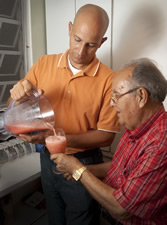Caregiver Wellbeing


Being a caregiver can be very tiring and stressful. This page offers tips for caregiver wellbeing, such as setting aside time for yourself, exercises and getting enough sleep.
Before reading the content on this page, it may be beneficial to review the following video(s) from the Office of Rural Health (ORH).
Caring for the Caregiver
Length: 04:56 (Link opens new window)
Margaret realizes she can’t face caregiving alone.
Dementia and Dementia Caregiving Facts
The Alzheimer’s Association reports that in 2012 more than 15 million Americans provided unpaid care for persons with dementia. The number of caregivers is steadily increasing. This means that you are not alone. Persons with dementia may not understand the need for the help you provide. They may not even show gratitude. However, it is important that you know that he or she most likely appreciate everything you do.
Caregiving for a loved one with dementia can be tiring and stressful. Research shows that caregivers usually feel more stressed than non-caregivers. However, too much stress and frustration can cause burn out and negatively affect your relationship with your loved one.
Caregiving Tips
It is important to set aside time for yourself each day.
- This may be difficult, because caregivers often do not have much free time. Try engaging your loved one in a task they enjoy, such as watching TV, looking at a newspaper, or sorting laundry. This can give you a few minutes of alone time.
Oftentimes, caregivers have their own health problems. 
- In addition to learning how to handle issues related to dementia, it is important to learn to maintain your own physical and emotional health.
- You can maintain your health by eating well, exercising, getting enough sleep (7-9 hours), visiting your doctor regularly
- Exercising can keep you healthy and reduces stress. It may be difficult to take time to exercise alone so consider exercising with your loved one. Take a short walk if it is safe and fits into your schedule.
Caregivers may experience difficulty sleeping, especially if their loved one often wakes in the night and wanders.
- Consider placing a sound monitor in your loved one’s room or putting small bells on their clothing to alert you if they get out of bed at night.
- If your loved one wakes frequently, try giving a light backrub to ease them back to sleep. Keep in mind that some individuals do not like to be touched, so this will vary from person to person.
Things to Remember 
1. Adjusting to your role as caregiver can be challenging. If you are struggling with this adjustment or feeling overwhelmed, consider talking to someone. This could be a family member, friend, counselor, mental health provider, or your doctor. You can learn more about resources available to caregivers by going to the Support for the Caregiver section of this website.
2. Your relationship with a loved one with dementia may change over time. Even though communication can be more challenging, it is important to express your feelings to your loved one. It is also important to listen to your loved one’s feelings. You will learn more about how to communicate with your loved one with dementia in the Communication section of this website.
3. Dementia can affect your loved one’s relationships with family members and friends. Try to help your loved one stay connected to the important people in his or her life. For example, consider having scheduled phone calls with family or friends, or asking them to mail pictures with short notes to the care recipient. Reminiscing with your loved one over these pictures and memories may be beneficial to your relationship.
4. When you are in public places, discretely communicating with those around you can help them understand your loved one’s behaviors and challenges. If your loved one is not always socially appropriate, consider making some small cards (index or business) explaining your loved one’s circumstances. You may give these to individuals questioning your loved one’s actions to help ease the situation. You can learn more about how to manage difficult behaviors in the Problem Behaviors section of this website.
Additional Resources 
VA Resources 
US Department of Veterans Affairs
VA values your commitment as a partner in our pledge to care for those who have "borne the battle." We have several support and service options designed with you in mind. The programs are available both in and out of your home to help you care for yourself and the Veteran you love.
- Caregiver Support Network
- VA Caregiver Support Line: 1-855-260-3274
- Additional Tips & Tools: Managing Medicines, Talking with your Provider, Caring for Oneself, Disaster Planning, Staying Organized, Moving around Safely.
Geriatrics and Extended Care Services (GEC) is committed to optimizing the health and well-being of Veterans with multiple chronic conditions, life-limiting illness, frailty or disability associated with chronic disease, agining or injury. This VA site reviews information on delirium, dementia and Alzheimer's care, decision making, home and community based services, and advance care planning, among many other important topics that may be important for you as a caregiver.
Veteran's Crisis Line Phone: 1-800-273-8255 (Veterans Press 1)
The VA does not endorse the following resources or guarantee that their information is 100% accurate. However, you may be able to find some helpful information by visiting the following pages:
AARP: Caregiver Resource Center
Find tips on how to care for yourself as a caregiver.
Alzheimer's Association: Alzheimer's and Dementia Caregiver Center
Review the information under the Caregiver Health section for more information on how to care for yourself as a caregiver.
AlzOnline: Caregiver Support Online
Find additional information on caregiver support.
References: Information adapted from Alzheimer’s Association and Office of Rural Health
If you have any questions or concerns, contact Dementia Caregiver Web Support.



















